- Home
- Markus Zusak
Bridge of Clay Page 15
Bridge of Clay Read online
Page 15
“When your dog died.”
It hit him hard. “The dog. How long have you been waiting to unleash that?” (There was no pun intended, I’m sure of it.)
“Never. It just came out.” Now she crossed her arms, but didn’t really cover herself, and she was beautiful and naked and her collarbones so straight. “Maybe it’s always been there.”
“You were jealous of a dog?”
“No!” Again, he was beside the point. “I’m just—I’m wondering why it took you months to walk to my front door after watching and waiting! Hoping I’d do it for you—to chase you down the road.”
“You never did that.”
“Of course not…I couldn’t.” She didn’t quite know where to look now, and settled for directly ahead. “God, you just don’t get it, do you?”
That last one was like a death knell—a truth so quiet and brutal. The effort it took had weakened her, if only momentarily, and she slid back down upon him, her cheek like stone on his neck. “I’m sorry,” she said, “I’m so sorry.”
But for some reason, he went on with it.
Maybe to welcome the nearing defeat.
“Just tell me.” The taste of his voice. It was dry and sandy, and those bricks had been thrown up to him, and he swallowed them each in turn. “Just tell me how to fix it.”
The act of breathing was suddenly an Olympic final, and where was Emil Zátopek when he needed him? Why hadn’t he trained like that lunatic Czech? An athlete with that sort of endurance could surely stand up to a night like this.
But could Michael?
Again:
“Just tell me, I’ll fix it.”
“But that’s it.”
Abbey’s voice was horizontal, put there, dropped on his chest. No anxiety, no labor.
No desire to fix or be fixed:
“Maybe there is nothing,” she said. “Maybe it’s.” She full-stopped. She began. “Maybe we’re just—not right, the way we thought.”
His last gasp now, final breath:
“But I—…” He cut off; he trailed. “So much.”
“I know you do,” and there was such pity in her, but a ruthless kind. “I do too, but maybe it’s not enough.”
Had she ended it with a pinprick, he’d have bled to death in bed.
The night ahead, having slept so long and hard during the day, was as wretched and restless as the last. He looked through the wooden box, and thought back to the morning porch:
The milk jumping the rail.
The jugular in my neck.
He saw Achilles and Tommy, Henry and Rory.
And Carey.
Of course he thought of Carey, and Saturday, and if she might go to The Surrounds anyway. He’d die to know, but would never ask her, and then he stopped and fully realized—a final forceful acknowledgment.
He got up and leaned forward on the desk.
You’re gone, he thought.
You left.
* * *
—
Soon after dawn the Murderer was up, too, and they walked the river like a road; they hiked up from the house.
At first there was a general slant, as the riverbed rose in altitude.
After a few hours, though, they were climbing giant, crestfallen boulders, and holding on to willows and river gums. Whether steep or gradual, one thing never changed; they could always see the power. The banks had a sort of girth. There was an obvious history of debris.
“Look at this,” the Murderer said. They were in a heavily wooded section; there were ladders of sunlight, hung up high in the shade, all in varied directions. His foot on an uprooted tree. A jacket of moss, and foliage.
And this, thought Clay.
He was next to an enormous rock, which appeared to have been dislodged.
They climbed more than half the day like that, and ate lunch on a long, granite overhang. They looked across the ranges.
The Murderer unpacked his bag.
Water. Bread and oranges. Cheese and dark chocolate. All of it passed from hand to hand, but nothing much more was said. Clay was sure there were similar thoughts, though—of the river, its showing of force:
So this is what we’re up against.
* * *
—
Through afternoon, they walked back down. Now and then a hand would reach up, to help the other, and when they returned, in darkness, in the riverbed, nothing more yet was spoken.
But surely it was now.
If ever there was a time to begin, it was this.
It wasn’t.
Not really:
There were still too many questions, too much memory—but one of them had to make a start, and the Murderer, rightfully, cracked first. If anyone was to attempt a sense of partnership, it should be him. They’d walked many miles together that day, and so he looked at him, and asked:
“You want to build a bridge?”
Clay nodded but looked away.
“Thanks,” said Michael.
“For what?”
“For coming.”
“I didn’t come here for you.”
Family bonding, the Clay way.
In many ways, I guess it’s true, that even bad times are full of good times (and great times) and the time of their demise was no different. There were still those Sunday mornings, when she’d ask him to read to her in bed, and she’d kiss him with her morning breath, and Michael could only surrender. He’d gladly read The Quarryman. He’d first run a finger on the lettering.
She’d say, “What was the name of that place again, where he learned about marble, and stone?”
Quietly, he’d answer.
The town was Settignano.
Or, “Read what it says about the Prisoners again.”
Page 265:
“They were wild and twisted—unfashioned, incomplete—but they were colossal, monumental anyway, and would fight, it seemed, for forever.”
“For forever?” She’d roll onto him and kiss his stomach; she’d always loved his stomach. “Is that a misprint, do you think?”
“No, I think he meant it. He’s gambling on us thinking it’s a mistake…imperfect, like the Slaves.”
“Huh.” She’d kiss and kiss again, across and over, up toward his ribcage. “I love it when you do that.”
“Do what?”
“Fight for what you love.”
* * *
—
But he couldn’t fight for her.
Or at least, not how she wanted.
To be fair, there was nothing malicious in Abbey Dunbar, but as time widened and the good moments shortened, it became clearer, each day, that their lives were going separate ways. More to the point, she was changing, he stayed the same. Abbey never took aim or attacked him. It just got slippery, the hanging on.
Looking back, Michael remembered movies. He remembered times when the entire Friday-night cinema laughed, when he laughed, and Abbey sat watching, unfazed. Then, when the whole brigade of moviegoers was dead silent, Abbey would smile at something private, just her and the screen. If only he could have laughed when she did, maybe they’d have been okay—
But he stopped himself.
That was ridiculous.
Movies and plastic popcorn don’t increase the chances of decimation, do they? No, it was more a compilation: a greatest hits of two people who’d traveled as far as they could together, to fade away.
* * *
—
Sometimes she had friends over from work.
They had clean fingernails.
Both women and men.
It was a long way from construction zones.
Michael was painting a lot in the garage, too, so his hands were either powdery or stubbed with color. He drank coffee from the kettle, they drank it from machines.
<
br /> As for Abbey, her hair was increasingly cropped, her smile business-like, and in the end, she was brave enough to leave. She could touch his arm like years gone by, with a comment or a quip. Or joke and wink and smile at him—but each time was less convincing. He knew very well that later on, they’d be in separate states of the bed.
“Good night.”
“I love you.”
“Love you, too.”
Often, he’d get up.
He’d go to the garage and paint, but his hands were so damn heavy, as if caked, cemented in. Often, he took The Quarryman, too, and read pages like a kind of prescription; each word to ease the pain. He would read and work till his eyes burned, and a truth beside, then on him.
There was he and Buonarroti.
One artist in the room.
* * *
—
Maybe if they’d argued.
Maybe that’s what was missing.
Some volatility.
Or maybe just more cleaning up.
No, it was pure and simple fact:
Life was pointed elsewhere for Abbey Dunbar now, and a boy she once loved, behind her. Where once he painted her and she loved him for it, now it seemed only a lifeline. He could capture her laughing over the dishes. Or standing by the sea, with surfers at her back, post-wave. They were still lovely and rich, those paintings, but where once there was only love in them, now it was love and neediness. It was nostalgia; love and loss.
* * *
—
Then one day, she stopped, midsentence.
She whispered, “It’s a shame…”
The suburban almost-quiet.
“It’s such a shame, because…”
“What?”
As was becoming more common, he didn’t really want to hear, and he turned his back on the answer. He was at the kitchen sink.
She said, “I think maybe you love the painted version of me more…you paint me better than I really am.”
The sun glittered. “Don’t say that.” He died right then, he was sure of it. The water was grey, sort of overcast. “Don’t ever say that again.”
* * *
—
When the end came, she told him in the garage.
He stood with paintbrush in hand.
Her bags were packed.
He should keep all the paintings.
Her expression apologetic, as he asked his futile questions. Why? Was there someone else? Did the church, the town, the everything mean nothing?
But even then, when fury should have ruled over sense, it was only threads of sadness that hung from the rafters. They blew and swung like cobwebs, so fragile and, ultimately, weightless.
A gallery of Abbeys stood behind them, watching the whole scene:
She laughed, she danced, she absolved him. She ate and drank and spread herself, naked, on the bed; all while the woman in front of him—the unpainted one—explained. There was nothing he could say or do. A minute’s worth of sorries. For all of it.
And his second-last plea was a question.
“Is he waiting out front?”
Abbey closed her eyes.
And the last, like a reflex, was this:
On a stool, by the easel, was The Quarryman, lying facedown, and he reached for it, he held the book out; and for some strange reason she took it. Maybe it was purely so that a boy and a girl could go after it, many years later….They would keep and read and obsess over it, lying on a mattress, in an old forgotten field, in a whole city of forgotten fields—and all of that coming from here.
She took it.
She held it in her hand.
She kissed her fingers and placed those fingers on the cover, and she was so sad, and somehow gallant, and she took it away, and the door blew shut behind her.
* * *
—
And Michael?
From the garage, he heard the engine.
Someone else.
He sagged to the paint-spattered stool and said “No” to the girl around him, and the engine grew louder, then ebbed, then disappeared completely.
For a long time, he sat, he kept quiet and shivery, and without a sound he started to cry. He cried his stray silent tears into the passing face of artworks close by—but then he relented, and laid himself down, curled up, on the floor. And Abbey Dunbar, who wasn’t Abbey Dunbar anymore, watched over him, all night, in all her many forms.
For the next four or five days, father and son fell into a routine. It was a careful, side-by-side partnership, maybe like two boxers in the opening rounds. Neither was willing to take too big a risk, for fear of being knocked out. Michael, especially, was playing it safe. He didn’t want any more of those I-didn’t-come-here-for-you moments. They weren’t good for anyone—or maybe just not for him.
On Saturday, the day Clay missed home the most, they walked down the river, instead of up, and he was tempted at times to talk.
At first it was only simple things.
Did the Murderer have a job?
Exactly how long had he lived here?
But then more searchingly, or appealing:
What the hell was he waiting for?
When would they start building?
Was this bridge procrastination?
It reminded him of Carey, and old McAndrew—how asking questions would hold her back. In his case, though, there was history.
As a boy who’d once loved stories, he’d been better before at asking.
* * *
—
Most mornings, the Murderer went to the riverbank and stood.
He could do it for hours.
Then he’d come in and read, or write on his loose-leaf papers.
Clay went out on his own.
Sometimes he went upriver; the great blocks of stone. He sat on them, missing everyone.
* * *
—
On Monday, they went to town, for food supplies.
They walked across the riverbed; its dryness.
They took the red box of a car.
Clay sent a letter to Carey and a collective note home, through Henry. Where the first was a detailed account of much that had happened, the second was typical of brothers.
Hi Henry—
Everything okay here.
You?
Tell the others.
Clay
He remembered Henry suggesting a phone to him, and the thought was somehow fitting; his note was more like a text.
He’d agonized over putting a return address on the envelopes, and chose to put one only on Henry’s. Telling Carey, though? He didn’t know. He didn’t want her to feel she had to write back. Or maybe he was scared she wouldn’t.
* * *
—
On Thursday, everything changed, or at least just slightly, in the evening; Clay sat with him voluntarily.
It was in the lounge room, and Michael said nothing, he just gave him a careful glance, and Clay on the floor, near the window. At first he’d been reading the last of her books—the generous Claudia Kirkby—but now he was onto a bridge almanac; the one he had read most often. The title wasn’t too inspired, but the book itself he loved. The Greatest Bridges of Them All.
For a while it was hard to concentrate, but after a good half hour, the first smile came to his face, when he saw his favorite bridge.
Le Pont du Gard.
Great wasn’t a great enough word to explain that bridge, which also served as an aqueduct.
Built by the Romans.
Or the devil, if you believed it.
As he looked at its arches—the half dozen huge ones at the bottom, eleven on its midlevel, and thirty-five across the top—he smiled, then felt it broaden.
When he caught himself, he check
ed.
Close one.
The Murderer nearly saw.
* * *
—
On Sunday evening, Michael found Clay in the riverbed, where the road, each side, was cut off. He stood a way back and spoke. “I have to go, for ten days.”
He did have a job.
In the mines.
Another six hours west, out past the old town, Featherton.
As he spoke, the setting sun looked lazy at first, far away. Trees were in lengthening shade.
“You can either go home for those ten days, or you can stay.”
Clay stood and faced the horizon.
The sky now hard-fought, leaking blood.
“Clay?”
The boy turned and gave him his first inkling of camaraderie then, or a piece of himself; he told a truth. “I can’t go home.” It was still far too early to attempt it. “I can’t go back—not yet.”
Michael’s reaction was to pull something from his pocket.
It was a real estate pamphlet, with photos of the land, the house, and a bridge. “Go on,” he said. “Take a look.”
The bridge had been a handsome one. A simple trestle, of railway sleepers and wooden beams, once spanning the space they were standing in.
“It was here?”
He nodded. “What do you think of it?”
Clay saw no reason to lie. “I like it.”
The Murderer ran a hand through his wavy hair. He rubbed at an eye. “The river destroyed it—not long after I moved in. And barely any rain since then. It’s been dry like this a good while.”
Clay took a step toward him. “Was there anything left?”
Michael pointed to the few embedded planks.
“That’s it?”
“That’s it.”
There was still the red rumbling out there, a silent flood of bleeding.
They walked back to the house.
At the steps, the Murderer asked.

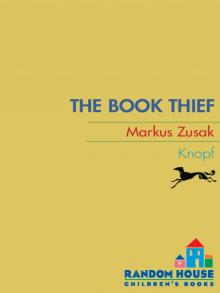 The Book Thief
The Book Thief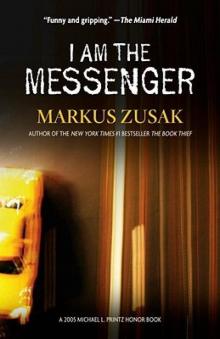 I Am the Messenger
I Am the Messenger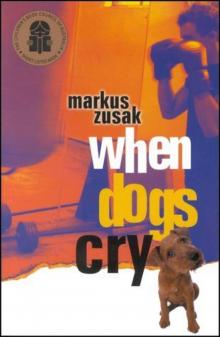 When Dogs Cry
When Dogs Cry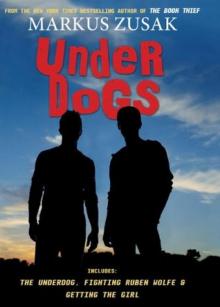 Underdogs
Underdogs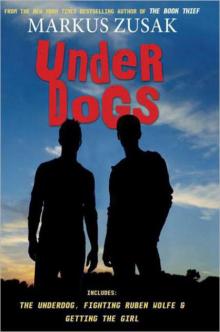 Underdogs: Three Novels
Underdogs: Three Novels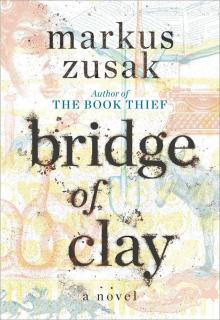 Bridge of Clay
Bridge of Clay